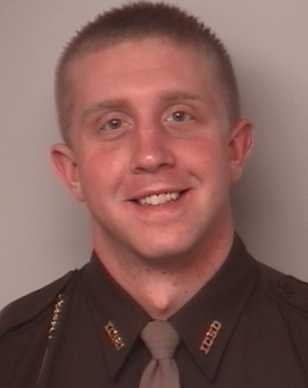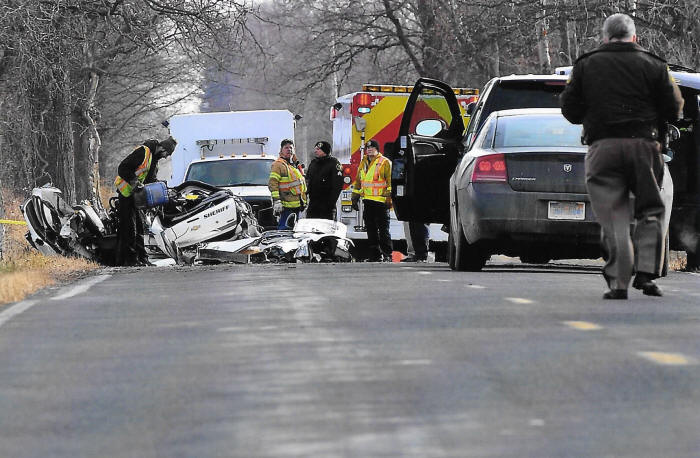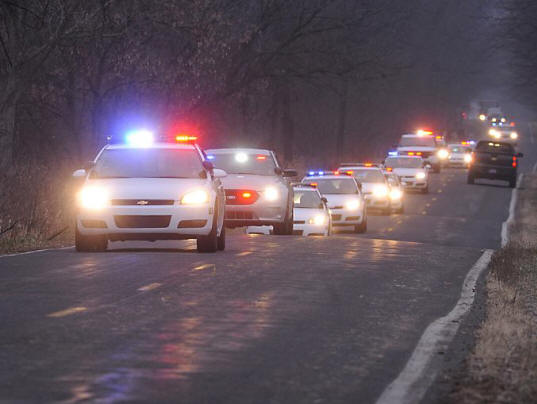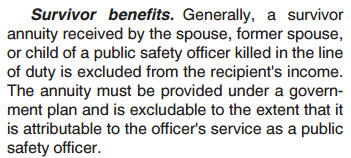On the left above is Ingham County Sheriff Deputy Grant Whitaker, age 25. He died when he lost control of his car and crashed into a tree. He had been travelling at 117 mph on a 2-lane blacktop in pursuit of an (at the time) unidentified speeder at 2:10 a.m. on a Sunday morning (December 7, 2014). His patrol car "disintegrated." (Lansing State Journal, 12/23/2014)
(Note: Kevin Grasha's 12/23/2014 story in the Lansing State Journal said Whitaker was travelling between 110 and 120 mph. I emailed Kevin asking how that was known. He replied "A state police crash reconstructionist used evidence from the scene (tire marks, etc.) as well as the car’s data recorder, which showed Whitaker was going 117 mph about 2 seconds before the crash.")
At the top on the right is the driver of the car being pursued. He is John Coryell Kelsey II, age 34, a convicted felon whose past crimes were victimless: driving with a suspended/revoked license, fleeing police, driving while intoxicated, delivery/manufacture of marijuana. He has been charged with driving with a suspended or revoked license causing death and first-degree fleeing police. Each is punishable by up to 15 years in prison. He also is charged as a habitual offender, which could increase the amount of prison time he serves, if convicted. (LSJ, 12/15/2014)
The fact that Kelsey was driving with a suspended or revoked license did not cause the death of Deputy Grant Whitaker. Whitaker's own recklessness caused his death. He was speeding at 117 mph on a 2-lane blacktop at 2:10 in the morning. He was possibly encouraged by his superiors: “The last thing we want to do is put the public at risk,” [Sheriff's Office Captain Eric] Trojanowicz said. “If this was a different time of the day, like at 5 p.m. when people are coming home from work, I can say rest assured we wouldn’t have pursued (the SUV).” (mlive.com, 12/8/2014)
While Kelsey is facing at least 15 years in prison, Whitaker got a hero's funeral. First was the "watch." For five days, in six-hour shifts, two of his colleagues stood guard over his body "Because when a police officer dies in the line of duty, he must never be alone." (LSJ, 12/12/14) The evening before the funeral, colleagues and officers from several different police agencies packed the lawn around the Police Memorial in front of the Sheriff's office in Mason for a candlelight vigil. Friday morning, the day of the funeral, there was a procession of police vehicles from the Ingham County Sheriff's Office in Mason to St. Mary Catholic Church in Chelsea.
After the funeral, a line of police vehicles 300 deep from as far away as Sleeping Bear Dunes escorted Whitaker from Chelsea to Stockbridge, Whitaker's home town, with lights flashing. A riderless horse awaited his return. (LSJ, 12/12/14) Police helicopters circled the cemetery and a flag suspended from two fire department ladder trucks waved above M-52. (mlive.com, 12/13/14) Bagpipes played "Amazing Grace." (LSJ, 12/12/14)
A dispatcher made the final call: "Badge 5497. Center to Badge 5497, Deputy Grant Whitaker. This is the last call for Grant William Whitaker. End of watch, Dec. 7, 2014. Gone but you will never be forgotten. Rest in peace, my friend. We have the watch from here. Go you en route to your new duty assignment." (mlive.com)
See a professionally-done, 4-minute video of the funeral complete with Josh Groban singing "You Lift Me Up" in the soundtrack.
Massive, elaborate funerals are the standard for law enforcement officers who die in the line of duty, and not just those whose deaths were homicides. In 2014, 121 out of 900,000 law enforcement officers in the U.S "made the ultimate sacrifice." Fifty-nine of them - less than half - were homicides (gunfire, vehicular assault and assault): (source)
These elaborate funerals are not spontaneous. In Michigan, they are organized by the Michigan Sheriff’s & Municipal Memorial Assistance Response Team (S.M.M.A.R.T.), created and led by Lieutenant Timothy Jungel of the Eaton County Sheriff’s Office: (source)
If there is no cost to the requesting agency for S.M.M.A.R.T.’s services, who does pay? Eaton county? The costs must be enormous. There is the time spent by the officers on casket watch and the hundreds of officers from all over the state who attend the funeral. Are they on payroll? Who is feeding them? What about the police cars in the procession to and from the funeral; who is paying for gas and wear-and-tear? What about the bagpipers, the horse, the bugler and the helicopters? And the hook-and-ladder trucks used to hoist the flag? How much of this big show is paid for by the public?
If someone other than we taxpayers is picking up the bill, we'd like to know so we can thank them.
Regardless of who is paying, the big show has a purpose other than honoring a fallen officer. It draws public attention to law enforcement officer deaths, exaggerating the dangers they face. You don't see elaborate funerals for roofers killed on the job. Roofers are 4th on Forbes Magazine's list of America's 10 deadliest jobs. Public safety officers are not among the top 10. It is true that police are often targeted by criminals, and some of their job activities expose them to other dangers, such as traffic accidents and heart attacks. But as for homicides, the death rate seems to be less than for the general population of men in their age range.
The funerals are just one way of publicizing officer deaths. There is also the Officer Down Memorial Page, which keeps track of all U.S. law enforcement officer deaths. (There is no comparable record of people killed by law enforcement officers.) There is the National Law Enforcement Officers Memorial in Washington DC. There is the Ingham County Law Enforcement Memorial in Mason. And coming soon to the west end of Lansing's capital complex is the Michigan Law Enforcement Officers Memorial Monument, as this sign a block east of MLK on Allegan says:
Here is the artist rendition:
I believe the elaborate funeral is just another piece of a deliberate public relations effort by the law enforcement industry to bolster their heroic image, and it is not just for self-esteem. They want more money. They want more jobs. They want to grow the industry by keeping drugs illegal. They want to be given the benefit of the doubt when they kill and injure the people they are supposed to be protecting. And they want plenty of heavy weapons to play with. Here's what they've managed to get from the Michigan legislature:
A final note on Deputy Grant Whitaker. The following is from the Ingham County Sheriff's website:
The site does not mention that Whitaker was single and had no children. His "family" is his parents. His parents are also entitled to a $40,000 life insurance benefit from Ingham County, $333,604.68 from the federal government's Public Safety Officers' Benefits Program and $25,000 from Michigan's Public Safety Officer Benefit Program. That money is not taxed by the federal government. This is from IRS Publication 559, page 15:
On top of that, there is Law Enforcement United, Inc., a 501(c)3 non-profit organization which solicits donations to support survivors of fallen officers and Concerns of Police Survivors (C.O.P.S.), which provides resources to help survivors and co-workers "rebuild their shattered lives." Locally, there is the Hundred Club of Greater Lansing, which raises money to provide immediate assistance and long-term support to surviving families of police officers and firefighters who die in the line of duty. And there is a theater group in Lansing called the Blue Light Players that is "dedicated to raising funds for the families of fallen police officers."
Send comments to stevenrharry@gmail.com.
Previous stories:
|




